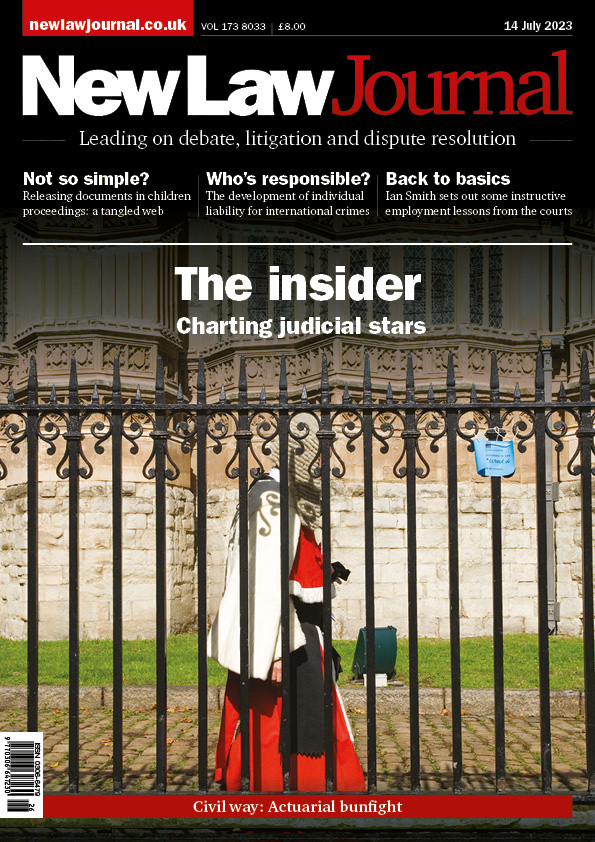THIS ISSUE

Which judges are tipped for the top jobs? In this week’s 'Insider', Professor Dominic Regan, of City Law School, praises Dame Sue Carr, the next Chief Justice, and reveals how her career could have taken an alternative albeit still high-profile trajectory!
Rules should be ‘simple and simply expressed’, according to the Courts Act 2003—yet Mr Justice Mostyn recently urged rule-makers to look again at the ‘Byzantine’ rules governing the release of documents to children proceedings.
The rise of legal consultants has been a game-changer for lawyers who want to work independently, manage their own caseload, and reduce the burdens of self-employment. In this week’s NLJ, Adrian Jaggard, CEO at AllC Group & Taylor Rose MW, looks ahead to the expansion of this model of working—research suggests one third of lawyers will work this way by 2026—and offers advice on how to prepare now for the changes to come.
The Nuremberg trials laid the groundwork for personal international criminal liability, and the process by which Vladimir Putin may one day be held responsible. In this week’s NLJ, Simon Parsons, associate lecturer at Bath Spa University, looks at the lack of individual liability for international crime before 1945.
As the courts gear up for the Long Vacation, Dominic Regan charts judicial stars on the rise & recommends a handy surgical procedure for costs lawyers
Back to school already? Ian Smith sets out some instructive lessons from the courts on the definition of a worker, the conduct of disciplinary hearings, & the perils of making a mistake
A Byzantine set of rules governs the release of documents in children proceedings: David Burrows calls for some sorely-needed simplicity
The courts in the Cayman Islands have shown a willingness to explore the link between insolvency & trust law in resolving novel issues: Christopher Levers & Jordan Constable analyse a recent example
In the first of a two-part series, Simon Parsons charts the development of individual liability for international crimes
Service without a seal; reducing tax penalties; no jokes: the Glancing blow; coughing impecuniosity; actuarial bunfight; chancery talk.
MOVERS & SHAKERS

Carey Olsen—Kim Paiva
Group partner joins Guernsey banking and finance practice
.tmb-mov69x69.jpg?sfvrsn=16d9dd3d_1)
Morgan Lewis—Kat Gibson
London labour and employment team announces partner hire

Foot Anstey McKees—Chris Milligan & Michael Kelly
Double partner appointment marks Belfast expansion
NEWS
The Ministry of Justice (MoJ) has not done enough to protect the future sustainability of the legal aid market, MPs have warned
Writing in NLJ this week, NLJ columnist Dominic Regan surveys a landscape marked by leapfrog appeals, costs skirmishes and notable retirements. With an appeal in Mazur due to be heard next month, Regan notes that uncertainties remain over who will intervene, and hopes for the involvement of the Lady Chief Justice and the Master of the Rolls in deciding the all-important outcome
After the Southport murders and the misinformation that followed, contempt of court law has come under intense scrutiny. In this week's NLJ, Lawrence McNamara and Lauren Schaefer of the Law Commission unpack proposals aimed at restoring clarity without sacrificing fair trial rights
The latest Home Office figures confirm that stop and search remains both controversial and diminished. Writing in NLJ this week, Neil Parpworth of De Montfort University analyses data showing historically low use of s 1 PACE powers, with drugs searches dominating what remains
Boris Johnson’s 2019 attempt to shut down Parliament remains a constitutional cautionary tale. The move, framed as a routine exercise of the royal prerogative, was in truth an extraordinary effort to sideline Parliament at the height of the Brexit crisis. Writing in NLJ this week, Professor Graham Zellick KC dissects how prorogation was wrongly assumed to be beyond judicial scrutiny, only for the Supreme Court to intervene unanimously







